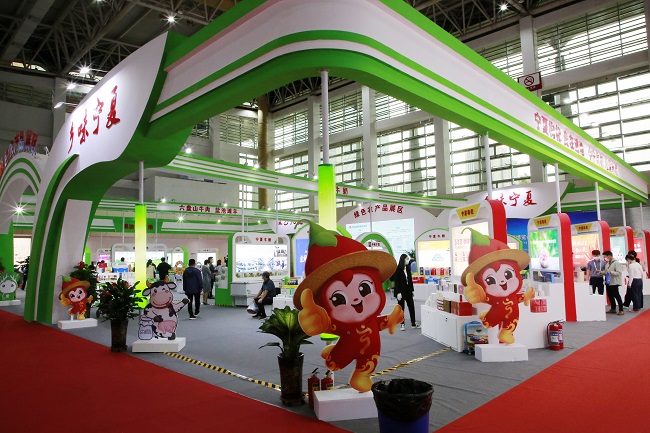
The fifth China-Arab States Expo ushers in an open day for the public on Aug 21, 2021. [Photo/CFP]
YINCHUAN -- At an exhibition booth at the ongoing fifth China-Arab States Expo, Yang Wanlong has been attracting a lot of domestic and foreign customers for his two products on display: nutritious Morchella fungi and high-quality activated carbon.
Yang, 27, runs a cross-border e-commerce company, and this exhibition, which opened Thursday in the city of Yinchuan, capital of Northwest China's Ningxia Hui autonomous region, is his first experience of such an event.
His booth is in the cross-border e-commerce exhibition area, and he has made the most of the opportunity by making meticulous preparations, designing a merchandise webpage and displaying his goods offline.
"I hope to take this opportunity to access the market in Arab countries, so that I can promote more high-quality local products and earn more through increased overseas orders," said the young man, clearly excited at the possibilities.
Last year, China-Arab trade volume reached nearly 240 billion U.S. dollars, with Arab states' imports from China rising by 2.1 percent year on year, despite the impact of the pandemic.
As an important platform for China-Arab economic ties, the fifth edition of the expo is being held both online and offline. The offline event at the Yinchuan International Convention and Exhibition Center allows customers to peruse the exhibitors' products in person. Meanwhile, thanks to technologies such as 5G, AI and big data, buyers and sellers are able to trade with each other in the virtual shop.
In ancient times, Arab and Chinese merchants made deals along the Silk Road. Today, China is pushing forward an "online Silk Road" by promoting the cross-border e-commerce industry, to further deepen the economic cooperation with Arab countries.
Data shows that in the first half of this year, China built good momentum in cross-border e-commerce trade, with the total trade value growing 28.6 percent year on year to reach 886.7 billion yuan (about $136.4 billion).
"Cross-border e-commerce has been developing rapidly, and I think it can be a very efficient way for Lebanese products to be sold in China," said Joseph Tannous, economic attache of the Lebanese embassy in Beijing.
A total of 15 Lebanese companies attended the expo online, displaying products such as red wine and olive oil.
"At the moment, we are working to create the first Lebanese online cross-border e-commerce shop in China. We hope this boutique will regroup many of Lebanon's high-quality products in China," he said. "I hope in the near future more and more Lebanese products will find their way to Chinese consumers."
Ningxia, as the permanent host of the China-Arab States Expo, has been working to build the "online Silk Road," introducing and cultivating more than 180 cross-border e-commerce companies.
Yang started his cross-border e-commerce business three years ago, retailing electronic products and daily necessities. Now he does business in more than 100 countries and regions across the world, including Morocco and the United Arab Emirates.
"We receive online orders from around the world and deliver the products to customers no matter where they are," Yang said.